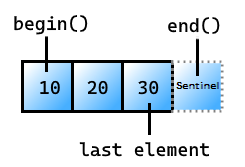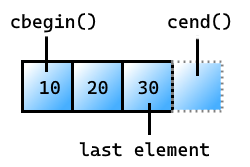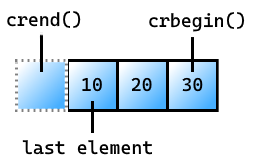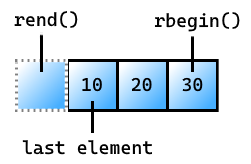Note
Access to this page requires authorization. You can try signing in or changing directories.
Access to this page requires authorization. You can try changing directories.
The <ranges>C++20 header includes the following non-member helper functions.
| Non-member functions | Description |
|---|---|
beginC++20 |
Get an iterator to the first element in the range. |
cbeginC++20 |
Get a const iterator to the first element in the range. |
cendC++20 |
Get the sentinel at the end of the const-qualified range. |
cdataC++20 |
Get a const pointer to the first element in the contiguous range. |
crbeginC++20 |
Get a reverse const iterator to the beginning of the range. |
crendC++20 |
Get the sentinel at the end of what crbegin() returns. |
dataC++20 |
Get a pointer to the first element in the contiguous range. |
emptyC++20 |
Test if the range is empty. |
endC++20 |
Get the sentinel at the end of the range. |
rbeginC++20 |
Get a reverse iterator to the beginning of the range. |
rendC++20 |
Get a reverse iterator to the sentinel at the end of the range. |
sizeC++20 |
Get the size of the range as an unsigned value. |
ssizeC++20 |
Get the size of the range as a signed value. |
Many of these 'functions' are implemented as customization point objects. A customization point object is a function object that can be overloaded on user-defined types, while also enforcing constraints on which kinds of types can be passed to the function object. The net effect is that the compiler figures out if there's a valid customized function to call for the passed in type, or if the default implementation should be used, or if the call is ill-formed.
Many of these functions have corresponding functions in the std namespace. But when working with ranges, use these helper functions instead. These functions use C++20 concepts, which provide better compile time errors. Because they're implemented as customization points, problems related to argument dependent lookup (ADL) and const correctness are avoided.
begin
Get an iterator to the first element in the range.
template<class T>
constexpr std::input_or_output_iterator auto begin(T&& rg);
Parameters
T
The type of the range.
rg
A range.
Return value
An iterator to the first element in the range:

If the range is an array, returns the equivalent of rg + 0.
If auto(rg.begin()) yields an iterator, returns the equivalent of auto(rg.begin()). If that expression is ill-formed, auto(begin(rg)) is used if that expression yields an iterator.
Remarks
ranges::begin() works on all ranges, whereas std::begin() may not.
Example: begin
// requires /std:c++20 or later
#include <vector>
#include <ranges>
#include <iostream>
int main()
{
std::vector<int> v = {10, 20, 30};
auto vi = std::ranges::begin(v);
std::cout << *vi << ' ' << *++vi; // outputs 10 20
}
cbegin
Get a const iterator to the first element in a range.
The iterator can access the elements in the range, but can't modify them.
template<class T>
constexpr std::input_or_output_iterator auto cbegin(T&& rg);
Parameters
T
The type of the range.
rg
A range.
Return value
A const iterator to the first element in the range:

If the range is an array, returns the equivalent of rg + 0.
If auto(rg.cbegin()) yields an iterator, returns the equivalent of auto(rg.cbegin()). If that expression is ill-formed, auto(cbegin(rg)) is used if that expression yields an iterator.
Remarks
ranges::cbegin() works on all ranges, whereas std::cbegin() may not.
Example: cbegin
// requires /std:c++20 or later
#include <vector>
#include <ranges>
#include <iostream>
int main()
{
std::vector<int> v = {10, 20, 30};
auto vi = std::ranges::cbegin(v);
std::cout << *vi; // outputs 10
// *vi = 100; // error because the iterator is const
}
cdata
Get a const pointer to the first element in the contiguous range.
template<class T>
constexpr std::add_pointer_t<ranges::range_reference_t<const T>> cdata(T&& rg);
Parameters
T
The type of the range.
rg
A range.
Return value
A const pointer, based on the type of the range, to the first element data in the contiguous range. For example, if the range is a vector of integers, the type of the return value is a const int *.
Example: cdata
#include <ranges>
#include <iostream>
int main()
{
std::vector v{10, 20, 30};
std::string src{ "a string" };
auto c_charPtr = std::ranges::cdata(src); // ptr is a const char *
auto c_intPtr = std::ranges::cdata(v); // ptr2 is a const int *
std::cout << c_charPtr << ", " << *c_intPtr << '\n'; // outputs a string, 10
// *c_intPtr = 100; // error - cannot assign to a const pointer
// *charPtr = 'A'; // error - cannot assign to a const pointer
}
cend
Get the sentinel at the end of the const-qualified range.
The iterator can access the elements in the range, but can't modify them.
template<class T>
constexpr std::sentinel_for<decltype(ranges::cbegin(std::declval<T>()))> auto cend(T&& rg);
Parameters
T
The type of the range.
rg
A range.
Return value
The sentinel that follows the last element in the const-qualified range:

Remarks
ranges::cend() works on all ranges, whereas std::cend() may not.
Example: cend
// requires /std:c++20 or later
#include <vector>
#include <ranges>
#include <iostream>
int main()
{
std::vector<int> v = {10, 20, 30};
auto i = std::ranges::cend(v);
--i; // get off the sentinel and onto the last element in the range
std::cout << *i; // outputs 30
// *i = 300 // error because the iterator is const
}
crbegin
Get a reverse const iterator to the first element in a reversed range.
A reverse iterator returns the elements of the range in reverse order.
The range itself isn't reversed; access to it is.
template<class T>
constexpr std::input_or_output_iterator auto crbegin(T&& rg);
Parameters
T
The type of the range.
rg
A range.
Return value
A reverse const iterator to the first element in the range. This iterator returns the elements of the range in reverse order, starting at the end of the range:

If the range is an array, returns the equivalent of reverse_iterator{rg + n} where n is the number of elements in the array.
If auto(rg.crbegin()) yields an iterator, returns the equivalent of auto(rg.crbegin()). If that expression is ill-formed, auto(crbegin(rg)) is used if that expression yields an iterator.
Remarks
ranges::crbegin() works on all bidirectional ranges, whereas std::crbegin() may not.
Example: crbegin
// requires /std:c++20 or later
#include <vector>
#include <ranges>
#include <iostream>
int main()
{
std::vector v{10, 20, 30};
auto vi = std::ranges::crbegin(v);
std::cout << *vi << ' ' << *++vi << ' ' << *++vi; // outputs 30 20 10
// vi[1] = 100; // error because the iterator is const
}
crend
Get the sentinel at the end of what crbegin() returns.
A reverse iterator returns the elements of the range in reverse order.
The range itself isn't reversed; access to it is.
template<class T>
std::sentinel_for<decltype(ranges::crbegin(declval<T>()))> auto crend(T&& rg);
Parameters
T
The type of the range.
rg
A range.
Return value
The sentinel at the end of what cbegin() returns. The sentinel follows the last element in a reversed view of the range:

Remarks
ranges::crend() works on all bidirectional ranges, whereas std::crend() may not.
crend example
// requires /std:c++20 or later
#include <vector>
#include <ranges>
#include <iostream>
int main()
{
std::vector v{10, 20, 30};
auto vi = std::ranges::crend(v);
--vi; // get off the sentinel and onto the last element in the reversed range
std::cout << *vi; // outputs 10
// vi[0] = 300; // error because the iterator is const
std::cout << *vi << ' ' << *--vi << ' ' << *--vi; // outputs 10, 20, 30
}
data
Get a pointer to the first element in a contiguous range.
template<class T>
constexpr std::add_pointer_t<ranges::range_reference_t<T>> data(T&& rg);
Parameters
T
The type of the range.
rg
A range.
Return value
A pointer, based on the type of the range, to the first element in the contiguous range. For example, if the range is a vector of integers, the type of the return value is an int *.
Example
// requires /std:c++20 or later
#include <vector>
#include <ranges>
#include <iostream>
int main()
{
std::vector v{10, 20, 30};
std::string src{ "a string" };
auto charPtr = std::ranges::data(src); // charPtr is a char *
auto intPtr = std::ranges::data(v); // intPtr is an int *
std::cout << charPtr << ", " << *intPtr << '\n'; // outputs a string, 10
*intPtr = 100;
*charPtr = 'A';
std::cout << charPtr << ", " << *intPtr; // outputs A string, 100
}
empty
Test if the range is empty.
template<class T>
constexpr bool empty(T&& rg);
Parameters
T
The type of the range.
rg
A range.
Return value
Returns true if the range has no elements; otherwise false.
Example
// requires /std:c++20 or later
#include <vector>
#include <ranges>
#include <iostream>
int main()
{
std::vector v{10,20,30};
std::vector<int> v2;
std::cout << std::boolalpha << std::ranges::empty(v); // outputs false
std::cout << std::boolalpha << ", " << std::ranges::empty(v2); // outputs true
}
end
Get the sentinel at the end of the range.
template<class T>
std::sentinel_for<ranges::iterator_t<T>> auto end(T&& rg);
Parameters
T
The type of the range.
rg
A range.
Return value
The sentinel that follows the last element in the range:

Remarks
ranges::end() works on all ranges, whereas std::end() may not.
Example
// requires /std:c++20 or later
#include <vector>
#include <ranges>
#include <iostream>
int main()
{
std::vector<int> v = {10, 20, 30};
auto i = std::ranges::end(v);
--i; // get off the sentinel and onto the last element in the range
std::cout << *i; // outputs 30
}
rbegin
Get a reverse iterator to the first element in a reversed range. A reverse iterator returns the elements of the range in reverse order. The range itself isn't reversed; access to it is.
template<class T>
constexpr std::input_or_output_iterator auto rbegin(T&& rg);
Parameters
T
The type of the range.
rg
A range.
Return value
A reverse iterator to the first element in the range. This iterator returns the elements of the range in reverse order, starting at the end of the reversed range:

If the range is an array, returns the equivalent of reverse_iterator{rg + n} where n is the number of elements in the array.
If auto(rg.rbegin()) yields an iterator, returns the equivalent of auto(rg.rbegin()). If that expression is ill-formed, auto(rbegin(rg)) is used if that expression yields an iterator.
Remarks
ranges::rbegin() works on all bidirectional ranges, whereas std::rbegin() may not.
Example
// requires /std:c++20 or later
#include <vector>
#include <ranges>
#include <iostream>
int main()
{
std::vector v{10, 20, 30};
auto vi = std::ranges::rbegin(v);
std::cout << *vi << ' ' << *++vi << ' ' << *++vi; // outputs 30 20 10
}
rend
Get a reverse iterator to the sentinel at the end of a reversed view of the range. A reverse iterator returns the elements of the range in reverse order. The range itself isn't reversed; access to it is.
template<class T>
constexpr
std::sentinel_for<decltype(ranges::rbegin(std::declval<T>()))> auto rend(T&& rg);
Parameters
T
The type of the range.
rg
A range.
Return value
A reverse iterator to the sentinel at the end of the range. The sentinel follows the last element in a reversed view of the range:

Remarks
ranges::rend() works on all bidirectional ranges, whereas std::rend() may not.
Example
// requires /std:c++20 or later
#include <vector>
#include <ranges>
#include <iostream>
int main()
{
std::vector v{10, 20, 30};
auto vi = std::ranges::rend(v);
--vi; // get off the sentinel and onto the last element in the reversed range
std::cout << *vi; // outputs 10
std::cout << *vi << ' ' << *--vi << ' ' << *--vi; // outputs 10, 20, 30
}
size
Get the number of elements in the range as an unsigned value.
template<class T>
constexpr /*unsigned integer-like type */ size(T&& rg);
Parameters
T
The type of the range.
rg
A range.
Return value
The number of elements in the range as an unsigned integer-like value.
Remarks
This function executes in constant time.
Example
// requires /std:c++20 or later
#include <vector>
#include <ranges>
#include <iostream>
int main()
{
std::vector v{10, 20, 30};
auto s = std::ranges::size(v); // s is a size_t
std::cout << s; // outputs 3
}
ssize
Get the size of the range as a signed value.
template<class T>
constexpr /* signed-integer-like type */ ssize(T&& rg);
Parameters
T
The type of the range.
rg
A range.
Return value
The number of elements in the range as a signed integer-like value.
Remarks
This function executes in constant time.
Example
// requires /std:c++20 or later
#include <vector>
#include <ranges>
#include <iostream>
int main()
{
std::vector v{10, 20, 30};
auto s = std::ranges::ssize(v);
std::cout << s; // outputs 3
}